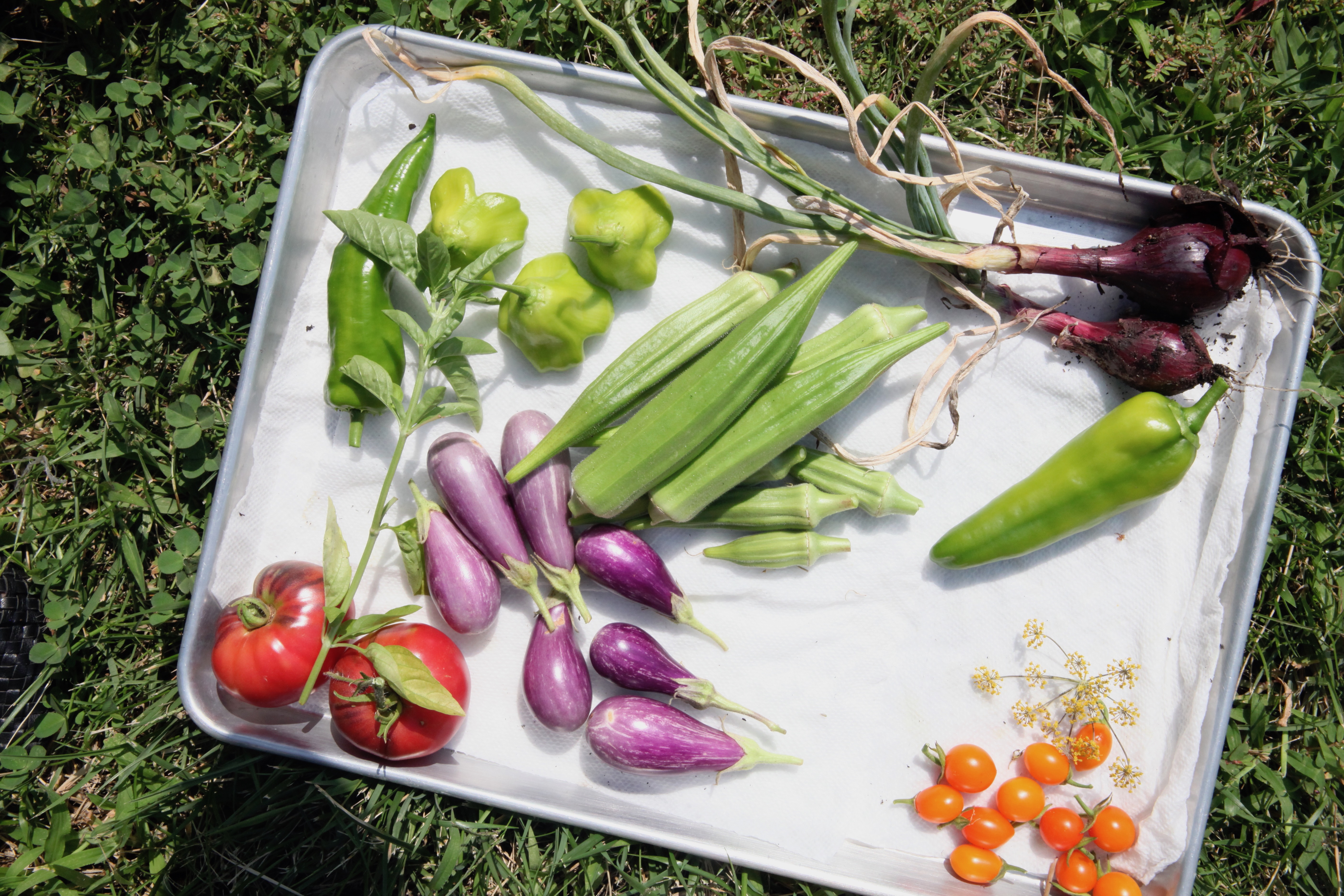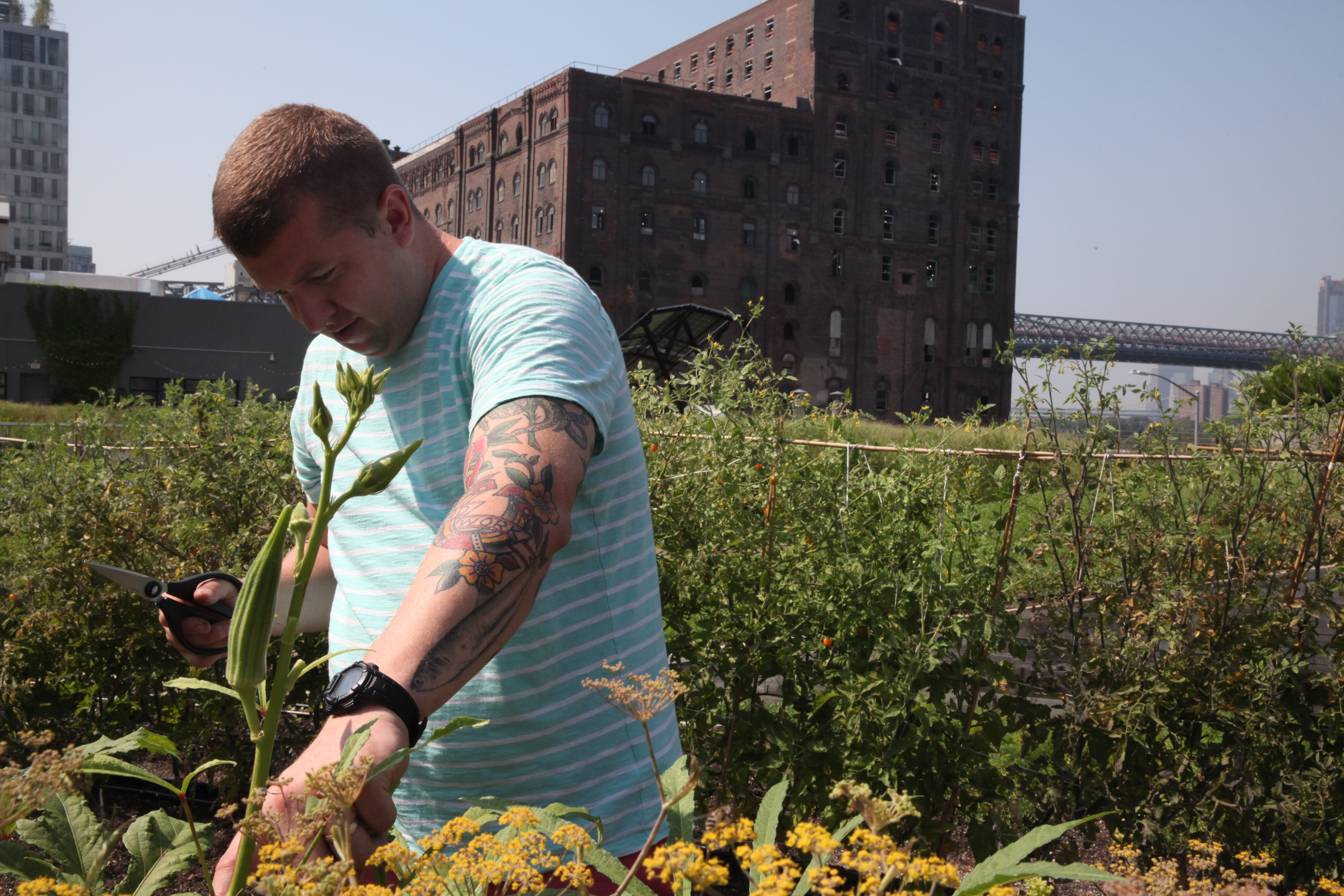Welcome back to Dirty Work, our series of dispatches from the MUNCHIES Garden. We’re inviting chefs, bartenders, and personalities in the world of food and drink to explore our edible playground and make whatever the hell inspires them with our rooftop produce. In the latest installment, chef Chris McDade of Brooklyn’s Popina shows us how he makes Italian food with a Georgia accent.
“I’ll pick these okra for you, but I wouldn’t use ‘em,” chef Chris McDade says, with a little disdain in his Southern drawl. He’s referring to our wildly overgrown okra pods, some of which are approaching six inches in length or longer. He, a good Southern boy from Georgia who learned all about growing okra in his grandma’s garden growing up, knows that by the time they get any bigger than three inches or so long, they’re far too woody to tolerate and their goopy inside are impossible to tame. We are… a little embarrassed by the state of things.
Videos by VICE

McDade is the executive chef and owner of Brooklyn’s Popina, which is his take on the Italian food he learned to love by traveling there, with his distinct Southern accent. (Think arancini with Anson Mills’ Carolina gold rice, and papardelle with a ham hock ragout.) He’s here to do the same with us today. On the menu: a pasta dish with sungold tomatoes and ricotta salata, fried okra and eggplant with tonnato, and a good ol’ heirloom tomato-and-mayo sandwich. (It was, after all, peak tomato season, and he brought his own Duke’s mayonnaise and everything.)



It was a truly sweltering day out in the garden, so to spare us all, he makes quick work of running through the raised beds, targeting just what he needed: some fairytale eggplants, (correctly sized) okra, a few plump heirloom tomatoes, a few sungold cherry tomatoes, peppers, and herbs. The rest, he’s brought with him from the restaurant.
Back inside in the safety of a well-air conditioned kitchen, he starts, first, on the tonnato and veggies. He splits and scores the miniature eggplants, then gets them frying over high heat in oil, scored-side-down, until they take on quite a bit of color. He flips them so the skins blister just a bit, then takes them out to rest on paper towels.


Next, he fries okra in such an effortlessly masterful way that we realize there are some things Yankees will just never be naturals at. He does a quick dry-wet-dry dredge, using flour, buttermilk, and cornmeal. In a regular sauté pan, in just a bit of oil, he shallow-fries the okra pieces until they’re perfectly golden brown, agitating them slightly with a spoon. He takes them out and drains them on paper towels, salting them for good measure.



To make the tonnato sauce, which is a traditional Italian summertime snack, he uses good-quality tuna preserved in-house at Popina in olive oil, anchovy fillets, a jalapeno, garlic, lemon juice, capers, and of course, a generous amount of Duke’s mayonnaise.

(If you’re not familiar yet with many a Southerner’s dedication to this particular mayonnaise brand, to illustrate the fervor with which McDade believes in Duke’s, he tells us that he hunts it down in Brooklyn at specialty grocery stores and has it shipped in bulk to the restaurant. As far as he’s concerned, the H-word is verboten in his place of business.) All tonnato ingredients go into the food processor, and are pulsed until well combined and smooth.


This dish is plated simply, and really, the tonnato is the star here. You could use this sauce with whatever veggies you can find that look good at the market. For what he collected from the garden today, McDade arranges the eggplants and okra along with some sliced young red onion and mild jalapeno on the plate, then drizzles the mayonnaise-and-tuna sauce atop it all. To finish, he sprinkles some peanut and benne seed dukkah (another element of his signature Southern-inflected global cuisine) over the whole thing. Luckily Farideh, our culinary director, snaps some photos of it quickly, because we don’t waste any time in wiping that plate clean.

MAKE THIS: Vegetables and Tonnato Sauce with Peanut and Benne Seed Dukkah
The pasta dish is the perfect use of ripe sungold tomatoes, just light enough for a summer dish but still plenty satisfying. He starts with pulsing some almonds in the food processors, but not too much. He adds minced jalapeno, olive oil, and salt. With a splash of olive oil in a medium-hot pan, he blisters the cherry tomatoes, so the skins start to wilt and the juices begin to run. He takes them out, letting them cool in a bowl, until he can peel the skins off.


While a pot of salted water comes up to a boil, the peeled tomatoes and almond mixture go back in a pan together, sautéing lightly so that their juices release even more. Once his pasta is perfectly al dente, he ladles the pasta and a significant amount of the cooking water into the tomato pan, cooking until it is reduced and the sauce begins to look silky. He hits it with a squeeze of lemon juice to brighten it up, then stirs in a bit of grated parmesan.

Once on the plate, he grates enough ricotta salata over top that it looks like a small snowcapped mountain.


MAKE THIS: Pasta with Sungold Tomato, Almonds, and Ricotta Salata
Last but not least, in the way any good Southern-raised chef worth his salt would plan to make himself lunch while busy with his prep for dinner service in August, he whips up a quick mayo and tomato sandwich. We couldn’t find him actual Wonder Bread in our immediate vicinity in Williamsburg, so he’ll make do with the closest thing we can get to it, which is another highly processed sliced white sandwich bread.


He slices some beautiful heirloom tomatoes, salts and peppers them generously, and lets them sit for a minute. He slathers a generous amount of Duke’s on both slices of bread, and stacks the tomatoes up high.

“That’s breakfast, lunch, and dinner this time of year for me,” he says. Thinking about it now, as the fall weather comes creeping in and the leaves start to change, we’re hoping we can find some of the season’s bumper crop of tomatoes at the farmer’s market this weekend still, just to hold on to a bit of the best parts of the summer while we can. If only he’d left us some of that Duke’s.




